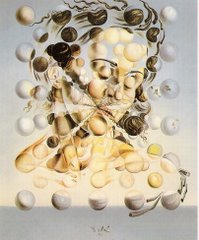Global warming is real and it's "probably"
our fault. Frankly, I'm surprised it took a team of scientists to figure this out, because who else's fault would it be? Oh right,
the cows. Regardless of whose fault it is,
here's a fun article from
Newsweek about how we can't and won't do anything about it.
But I'm not here to get up on my soapbox about global warming. I'm no expert. I haven't read
An Inconvenient Truth, I don't drive an electric car, and I haven't even seen the electric car movie (although I hope to do all of these things sooner than later).
No, I'm here to talk about the draft. Wait, I'm actually here to talk about the Bible. Again. I was watching
The Search for Noah's Ark (one of my favorite Biblical subjects) on
The History Channel the other day. In addition to searching for the physical location of Noah's big boat, various well-educated people were exploring theories about what (aside from the wrath of God, that is) might have caused such a large-scale flood that people would be talking about it for thousands of years. And the most interesting theory (to me, anyway), was that Noah's flood was caused by global warming. That's right. The Earth got too warm, the oceans started to rise, and the Mediterranean
spilled into the
Black Sea through a narrow isthmus. There is archealogical evidence of this, in fact, in the form of underwater beaches. While this may or may not be the origin of the
Biblical flood story, it's certainly worth thinking about.
Am I saying global warming is not caused by humans, if it was happening thousands of years ago? Not really. The people in the Bible didn't have cars, but they certainly burned a lot of stuff (all those animal sacrifices, for one thing). I'm no scientist, but I don't think it's improbable that people could have been the cause of global warming all the way back then. What I'm really trying to say is that, when the oceans start rising, it's a big deal, and when they say that the oceans will rise 7-23 inches in the next 100 years, I find it pretty scary.
What should we do? Whatever we can, I guess. There are some good ideas
here. Check out
these awesome solar panels Japanese engineers are working on. Thanks, Japanese engineers! Maybe by the time I buy a house (or an ark) they'll have the technology perfected.

(edited to add that my awesome sister has listed some great suggestions for fighting global warming in the
comments section: check it out!)
 So, I joined a gym today. Woo...hoo...? Although I'm excited about it, I never really saw myself as the gym-going type. Maybe because the thought of going to the gym makes me flash back to those elementary and junior-high school P.E. classes, where the non-athletic (me) got mixed in with the super-athletic (girls' basketball team) and were forced to compete against each other, with appropriately hilarious (embarrassing) results.
So, I joined a gym today. Woo...hoo...? Although I'm excited about it, I never really saw myself as the gym-going type. Maybe because the thought of going to the gym makes me flash back to those elementary and junior-high school P.E. classes, where the non-athletic (me) got mixed in with the super-athletic (girls' basketball team) and were forced to compete against each other, with appropriately hilarious (embarrassing) results. 
















